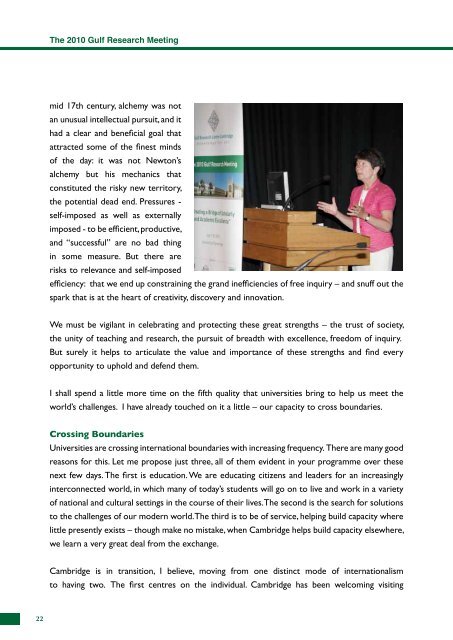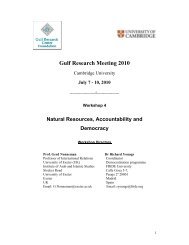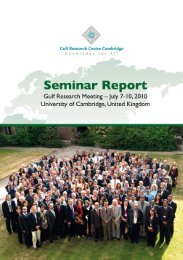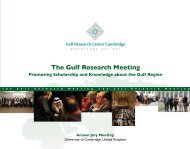GRM 2010 Report - Centre of Islamic Studies - University of ...
GRM 2010 Report - Centre of Islamic Studies - University of ...
GRM 2010 Report - Centre of Islamic Studies - University of ...
You also want an ePaper? Increase the reach of your titles
YUMPU automatically turns print PDFs into web optimized ePapers that Google loves.
22<br />
The <strong>2010</strong> Gulf Research Meeting<br />
mid 17th century, alchemy was not<br />
an unusual intellectual pursuit, and it<br />
had a clear and beneficial goal that<br />
attracted some <strong>of</strong> the finest minds<br />
<strong>of</strong> the day: it was not Newton’s<br />
alchemy but his mechanics that<br />
constituted the risky new territory,<br />
the potential dead end. Pressures -<br />
self-imposed as well as externally<br />
imposed - to be efficient, productive,<br />
and “successful” are no bad thing<br />
in some measure. But there are<br />
risks to relevance and self-imposed<br />
efficiency: that we end up constraining the grand inefficiencies <strong>of</strong> free inquiry – and snuff out the<br />
spark that is at the heart <strong>of</strong> creativity, discovery and innovation.<br />
We must be vigilant in celebrating and protecting these great strengths – the trust <strong>of</strong> society,<br />
the unity <strong>of</strong> teaching and research, the pursuit <strong>of</strong> breadth with excellence, freedom <strong>of</strong> inquiry.<br />
But surely it helps to articulate the value and importance <strong>of</strong> these strengths and find every<br />
opportunity to uphold and defend them.<br />
I shall spend a little more time on the fifth quality that universities bring to help us meet the<br />
world’s challenges. I have already touched on it a little – our capacity to cross boundaries.<br />
Crossing Boundaries<br />
Universities are crossing international boundaries with increasing frequency. There are many good<br />
reasons for this. Let me propose just three, all <strong>of</strong> them evident in your programme over these<br />
next few days. The first is education. We are educating citizens and leaders for an increasingly<br />
interconnected world, in which many <strong>of</strong> today’s students will go on to live and work in a variety<br />
<strong>of</strong> national and cultural settings in the course <strong>of</strong> their lives. The second is the search for solutions<br />
to the challenges <strong>of</strong> our modern world. The third is to be <strong>of</strong> service, helping build capacity where<br />
little presently exists – though make no mistake, when Cambridge helps build capacity elsewhere,<br />
we learn a very great deal from the exchange.<br />
Cambridge is in transition, I believe, moving from one distinct mode <strong>of</strong> internationalism<br />
to having two. The first centres on the individual. Cambridge has been welcoming visiting





